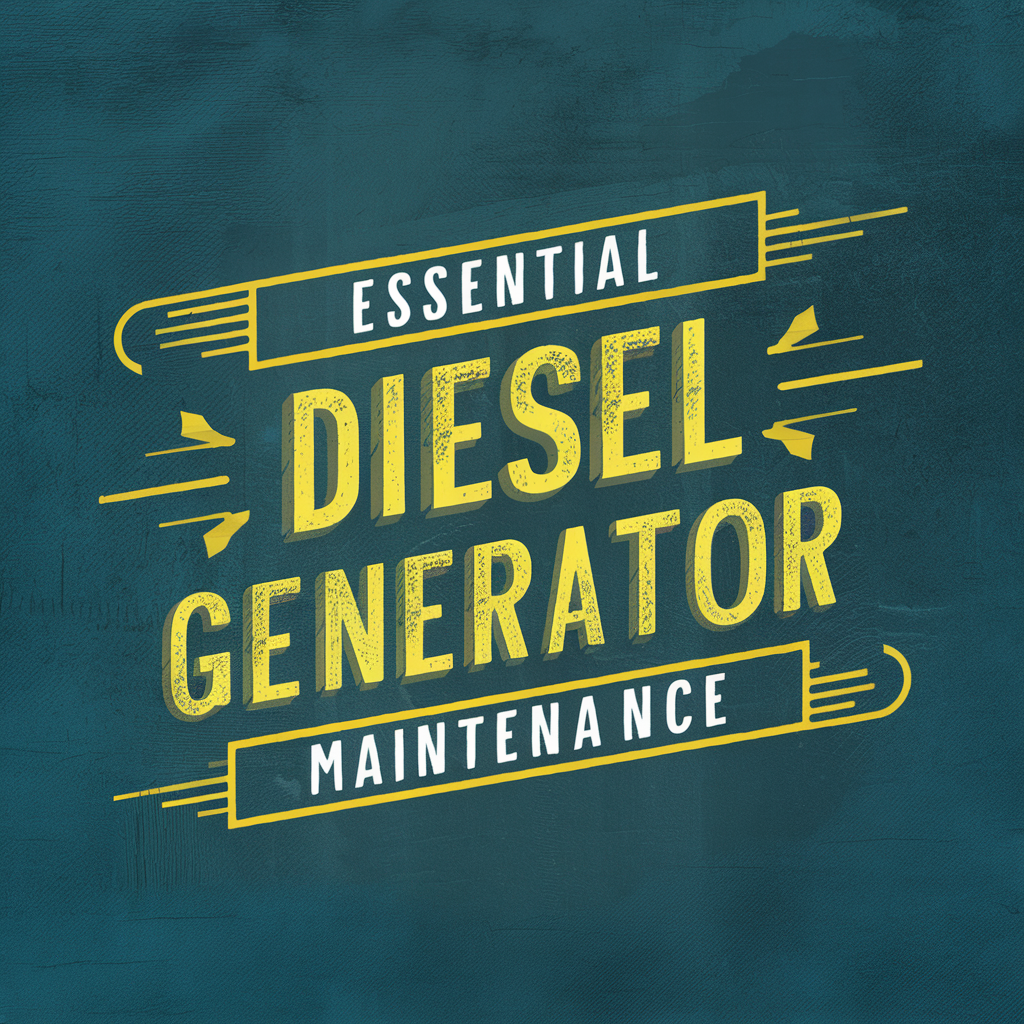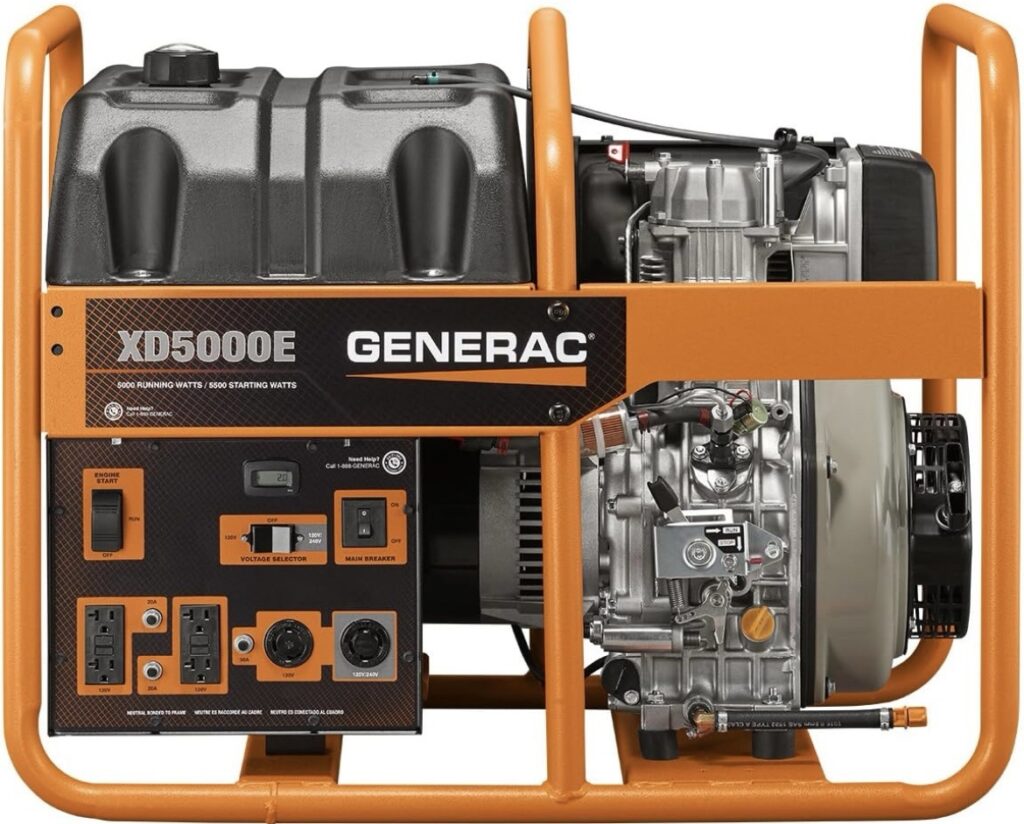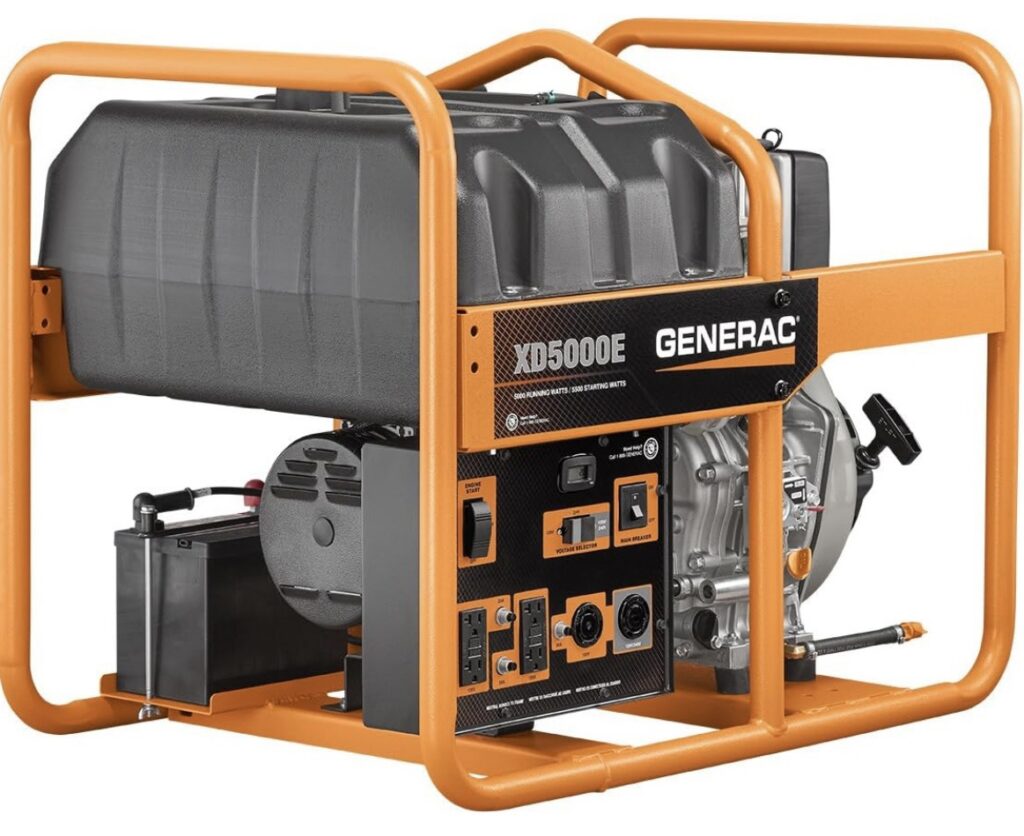
Why Is Diesel Generator Maintenance So Important?
Over the years, I’ve learned that owning a diesel generator is one of the best investments you can make for reliable power, whether it’s for your home, a job site, or emergencies. But like any valuable piece of equipment, a diesel generator requires regular maintenance to keep it running smoothly. It’s not just about ensuring that it’ll start when you need it most; it’s about prolonging the life of the generator and getting the most out of your investment.
I’ve seen firsthand what can happen when maintenance is neglected. A few years back, I thought I could get away with skipping an oil change on my generator—after all, it was running just fine. That was until it suddenly started sputtering during a critical power outage. It was a wake-up call that taught me the hard way: regular maintenance isn’t optional; it’s essential.
Proper maintenance of your diesel generator can save you from unexpected breakdowns, costly repairs, and the frustration of being without power when you need it most. In this article, I’ll share the key maintenance tasks I’ve found to be the most critical, and how sticking to a routine has kept my generator in top shape for years.
For those still considering whether a diesel generator is the right choice, you might want to check out my insights on why diesel generators are so reliable. But if you already have one, let’s dive into what you need to know to keep it running like new.

What Are the Basics of Diesel Generator Maintenance?
When it comes to keeping your diesel generator running smoothly, there are a few basic maintenance tasks that you simply can’t afford to skip. These might seem straightforward, but trust me, they make all the difference in ensuring your generator is ready to go whenever you need it. Here’s what I’ve learned to prioritize in my routine maintenance.
How Often Should You Perform Routine Checks?
Routine checks are the backbone of diesel generator maintenance. I make it a habit to inspect my generator at least once a month, even if I haven’t used it. These checks are quick and easy, but they give me peace of mind that everything is in working order.
Here’s what I focus on:
- Oil Levels: Just like with your car, the oil in your generator needs to be at the right level to keep the engine lubricated and running smoothly. I always check the oil before and after any extended use and top it off as needed. If the oil looks dark or dirty, it’s a sign that it’s time for a change.
- Fuel Quality: Diesel can degrade over time, especially if it’s been sitting in the tank for a while. I’ve learned to drain old fuel and replace it with fresh diesel every few months to prevent any issues. Adding a fuel stabilizer also helps keep the fuel in good condition.
- Battery Health: Your generator’s battery is crucial for starting the engine, especially in cold weather. I check the battery terminals for corrosion and ensure that it’s holding a charge. If the battery’s voltage starts dropping, it’s better to replace it before it fails completely.
Keeping a consistent schedule for these routine checks has saved me from many potential headaches down the road. It’s a small investment of time that pays off big when you need your generator to perform.
Why Is Regular Oil Change Crucial for Your Diesel Generator?
If there’s one piece of maintenance advice I can’t stress enough, it’s the importance of regular oil changes. Diesel engines work hard, and the oil is what keeps all those moving parts running smoothly. Over time, the oil breaks down and becomes less effective at lubricating the engine, which can lead to increased wear and tear or even a breakdown.
I make it a point to change the oil in my diesel generator after every 100 hours of operation, or at least once a year if I haven’t hit that mark. The process is straightforward: drain the old oil, replace the oil filter, and refill with fresh oil. I always use the oil type recommended by the manufacturer, which you’ll find in your generator’s manual.
Trust me, neglecting this simple task can cost you. A few years back, I got busy and pushed my oil change way past the recommended interval. The result? My generator started running rough and eventually stalled. A quick oil change got it back to normal, but I learned my lesson—don’t skip this step.
How Do You Keep the Fuel System in Top Condition?
The fuel system is another critical area where maintenance can’t be overlooked. Diesel fuel, if left untreated, can start to degrade, leading to clogs in the fuel injectors or filters. I’ve found that using a fuel stabilizer is key to keeping the fuel fresh, especially if the generator sits unused for long periods.
I also make it a habit to check for water in the fuel, which can happen due to condensation in the tank. Draining the fuel tank and cleaning the fuel lines every so often helps prevent any issues. Keeping your fuel system in top condition ensures that your generator runs efficiently and reliably every time you start it up.

How Can You Prevent Common Diesel Generator Problems?
Over the years, I’ve encountered a few common issues with diesel generators, most of which could have been avoided with a bit of proactive maintenance. Whether it’s battery failure, overheating, or unexpected smoke, knowing what to look out for and how to address these problems can save you from a lot of frustration. Here’s what I’ve learned about preventing some of the most common diesel generator problems.
What Are the Signs of Battery Failure, and How Can You Prevent It?
One of the first issues I ran into with my diesel generator was a dead battery. After sitting idle for a few months, the battery simply didn’t have enough charge to start the engine. It was an easy fix—a quick jumpstart got it running—but it was a wake-up call about the importance of battery maintenance.
Here’s what I do now to prevent battery failure:
- Regular Charging: If your generator isn’t used regularly, the battery can lose its charge over time. I use a trickle charger to keep the battery topped off, especially during the off-season. This ensures the battery is always ready when I need it.
- Terminal Cleaning: Corrosion on the battery terminals is another common issue. Every couple of months, I check the terminals and clean off any buildup with a wire brush and a mixture of baking soda and water. It’s a simple step, but it keeps the electrical connections strong.
- Battery Replacement: Even with good maintenance, batteries don’t last forever. I replace the generator’s battery every 3-4 years to avoid unexpected failures. It’s a small cost compared to the hassle of dealing with a dead battery during an emergency.
By staying on top of these tasks, I’ve managed to avoid any more surprises with my generator’s battery.
How Do You Avoid Overheating Issues?
Overheating is another problem that can cripple your diesel generator if you’re not careful. I’ve had my generator overheat once, and it was a real headache—especially because it happened during a heatwave when I needed it most. To prevent this from happening again, I’ve made sure to keep the cooling system in check.
Here’s how I avoid overheating:
- Ventilation: Diesel generators need plenty of airflow to stay cool. I always place my generator in a well-ventilated area, away from walls or obstructions that could block airflow. If you’re using your generator in a shed or other enclosed space, make sure there’s adequate ventilation to allow heat to escape.
- Coolant Levels: Just like a car, your diesel generator needs coolant to regulate engine temperature. I check the coolant levels regularly and top them off as needed. I also inspect the coolant hoses for any signs of wear or leaks.
- Clean Air Filters: A dirty air filter can restrict airflow and contribute to overheating. I make it a point to clean or replace the air filter every few months, depending on how often I use the generator.
Since I started paying closer attention to these areas, I haven’t had any issues with overheating. It’s made a big difference, especially during those long summer days when my generator is running for hours at a time.
What Should You Do if Your Generator Produces Excessive Smoke?
If you’ve ever seen your diesel generator start puffing out smoke, you know it’s a cause for concern. I remember the first time mine did—it was alarming, but fortunately, it wasn’t a disaster. Diesel engines can produce different types of smoke, and each one tells a different story about what might be going wrong.
Here’s what I’ve learned about troubleshooting smoke issues:
- Black Smoke: This usually means there’s too much fuel in the air-fuel mixture, or the air filter is clogged. When I noticed black smoke from my generator, I checked and cleaned the air filter, which resolved the issue. It’s also a good idea to inspect the fuel injectors if the problem persists.
- White Smoke: This could indicate that the fuel isn’t burning properly, possibly due to low engine temperature or water in the fuel. After seeing white smoke, I drained the fuel tank, replaced it with fresh diesel, and the smoke cleared up. White smoke is more common when starting the generator in cold weather, so giving it a few minutes to warm up can also help.
- Blue Smoke: Blue smoke typically signals that oil is getting into the combustion chamber, possibly due to worn piston rings or valve seals. This one’s a bit trickier, and it might require professional attention if it doesn’t resolve after an oil change.
By knowing what to look for and how to address these issues, I’ve been able to keep my generator running smoothly and avoid costly repairs. Keeping an eye on the type and color of smoke your generator produces can be a key indicator of its overall health.

How Can You Extend the Life of Your Diesel Generator?
If there’s one thing I’ve learned from owning a diesel generator, it’s that taking care of it now pays off in the long run. Diesel generators are built to last, but like any piece of machinery, they require consistent care to keep running efficiently year after year. Here are some strategies I’ve used to extend the life of my generator and ensure it’s always ready to go when I need it.
What Role Does Proper Storage Play in Generator Longevity?
I can’t stress enough how important proper storage is for maintaining your diesel generator. Early on, I made the mistake of leaving my generator outside, exposed to the elements. It wasn’t long before I noticed rust forming and the engine starting to deteriorate. Now, I make sure to store my generator in a dry, clean area, and it’s made a world of difference.
Here’s how I store my generator:
- Keep It Dry and Clean: I store my generator in a garage or shed, where it’s protected from rain, snow, and humidity. Before storing it, I clean off any dirt or debris to prevent rust and corrosion.
- Cover It Up: Even when stored indoors, I cover my generator with a breathable cover to keep dust and moisture at bay. This also prevents pests from making a home inside the generator.
- Regular Inspection: Every few months, I inspect the storage area and the generator itself. I check for any signs of moisture or pest damage and address them immediately.
Proper storage has not only kept my generator looking good but also running smoothly. It’s a simple step, but it can significantly extend the life of your equipment.
Why Should You Run Your Generator Regularly, Even If You Don’t Need It?
I used to think that if I wasn’t using my generator, I could just leave it alone until the next power outage. But after a few seasons of inactivity, I found out the hard way that a generator needs to be exercised regularly, even if you don’t think you need it at the moment.
Here’s what I do now:
- Monthly Exercise Routine: Once a month, I start up my generator and let it run for about 30 minutes. This helps keep the engine lubricated and ensures that everything is functioning properly. Running it under a load—like powering a few household appliances—also helps keep the internal components in good shape.
- Fuel Circulation: Running the generator regularly also keeps the fuel circulating, which prevents it from getting stale or causing clogs in the system. I’ve found that this practice keeps the generator more responsive and reliable when I actually need it.
- Identifying Issues Early: By running the generator periodically, I can catch any small issues—like a weak battery or dirty air filter—before they turn into bigger problems. This has saved me from unexpected failures more than once.
Regular exercise has been key to keeping my generator in top condition. It’s like keeping your car’s engine running smoothly by taking it for a drive every so often, even if you don’t have anywhere to go.
How Can Preventative Maintenance Save You Money?
Preventative maintenance might seem like an unnecessary chore, but in my experience, it’s one of the best ways to save money in the long run. A few years ago, I skipped some routine checks and ended up with a hefty repair bill when my generator broke down during a storm. Now, I make sure to stay on top of maintenance tasks, and it’s paid off in more ways than one.
Here’s why it’s worth it:
- Avoiding Costly Repairs: By taking care of small issues—like replacing a worn-out air filter or changing the oil—I’ve avoided the much higher costs of major repairs. It’s a lot cheaper to buy a new battery or a set of spark plugs than to replace an entire engine component.
- Extending Equipment Life: Preventative maintenance keeps all parts of the generator working efficiently, which extends its overall lifespan. I know that with regular care, my generator will last for many years, saving me the cost of having to buy a new one anytime soon.
- Reliable Performance: When you maintain your generator properly, you can trust that it will perform when you need it most. This peace of mind is priceless during emergencies when reliable power is critical.
Preventative maintenance has not only kept my generator running smoothly but has also saved me from the frustration and expense of dealing with unexpected breakdowns. It’s an investment of time and effort that really pays off.
For those interested in why a diesel generator is such a reliable choice, I’ve written more about it in this article. Understanding the value of reliability is key to appreciating the importance of ongoing maintenance.

What Tools and Supplies Do You Need for Diesel Generator Maintenance?
One of the things I’ve learned over the years is that having the right tools and supplies on hand can make diesel generator maintenance a lot easier. When you’re prepared, routine checks and fixes become quick and painless, rather than a dreaded chore. Here’s what I keep in my maintenance kit to ensure my generator stays in top condition.
What Are the Must-Have Tools for Basic Maintenance?
Having the right tools at your disposal is essential for performing basic maintenance tasks. Here are the tools I always keep on hand:
- Wrenches and Screwdrivers: A set of wrenches and screwdrivers is essential for loosening and tightening bolts, removing covers, and performing other minor repairs. I make sure to have a range of sizes to fit different parts of the generator.
- Oil Pan and Funnel: When it’s time to change the oil, an oil pan and funnel make the job much cleaner and easier. I also keep some rags or paper towels nearby to wipe up any spills.
- Battery Tester: A battery tester is crucial for checking the health of your generator’s battery. This tool has saved me more than once by alerting me to a weak battery before it completely died.
- Wire Brush: A wire brush is great for cleaning corrosion off battery terminals and other metal parts. Keeping those connections clean helps ensure that your generator starts smoothly every time.
With these tools in my kit, I’m ready to handle most of the routine maintenance tasks my diesel generator requires. It’s also worth mentioning that if you’re into DIY projects around the house, you might already have most of these tools. For more tips on keeping your home safe and functional, check out this guide on non-toxic ways to repel hornets, wasps, and bees, which has come in handy more times than I can count.
Which Maintenance Products Should You Keep on Hand?
In addition to tools, having the right maintenance products can make a big difference in how well your diesel generator performs over time. Here are the essentials I always keep stocked:
- Engine Oil: Regular oil changes are a must for keeping your generator’s engine running smoothly. I use the oil recommended by the generator’s manufacturer to ensure the best performance and longevity.
- Fuel Stabilizer: Diesel fuel can degrade over time, leading to potential clogs and poor performance. Adding a fuel stabilizer to your fuel tank can prevent this and keep your generator running efficiently.
- Coolant: Just like in a car, coolant is necessary to regulate the engine’s temperature. I always keep an extra bottle of coolant on hand to top off the levels as needed, especially during the summer months when the generator is more likely to overheat.
- Air Filters: A clean air filter is vital for proper airflow and preventing contaminants from entering the engine. I replace the air filter regularly, and I always keep a few spares on hand.
Having these products available has made it much easier to stay on top of maintenance tasks. And if you’re into outdoor activities like camping, you know the importance of having the right gear. I recently upgraded my camping setup with the ultimate campfire cooking kit, which has made outdoor cooking more enjoyable and hassle-free. Just like with generator maintenance, having the right tools and supplies can make all the difference.

How Do You Know When It’s Time for Professional Servicing?
Even with the best maintenance routine, there are times when your diesel generator might need more than just a DIY fix. I’ve been there—standing in front of my generator, tools in hand, realizing that the problem is beyond what I can handle. Knowing when to call in a professional can save you from making the issue worse and ensure that your generator stays in top working condition. Here’s what I’ve learned about recognizing when it’s time for professional servicing.
When Should You Call a Professional?
There are certain issues that are best left to the experts, especially if you’re not comfortable or experienced with complex repairs. Here are some situations where I’ve found it’s better to call in a professional:
- Electrical Problems: If your generator is having issues with power output, tripping breakers, or there are signs of electrical faults, it’s time to get a professional involved. Electrical problems can be dangerous to troubleshoot without the right expertise, and it’s not worth risking injury or further damage.
- Engine Noises or Vibrations: Strange noises or excessive vibrations are often a sign that something is wrong internally with the engine. This could be due to worn-out parts, loose components, or more serious engine damage. When I first heard an unusual knocking sound from my generator, I knew it was time to bring in a professional. It turned out to be a simple fix, but it’s always better to be safe than sorry with engine issues.
- Fuel System Issues: Problems like fuel leaks, injectors not working correctly, or a complete failure to start can indicate deeper issues with the fuel system. I had a fuel injector clog once that I couldn’t clear myself, and the generator wouldn’t start no matter what I tried. A professional was able to diagnose and fix the problem quickly.
- Complex Repairs: If a repair requires disassembling major parts of the generator, or if it involves something you’re not familiar with, it’s better to leave it to a technician. I’ve learned that sometimes, doing less can actually save you more—especially when it comes to avoiding costly mistakes.
By knowing your limits and recognizing when it’s time to call in a professional, you can prevent minor issues from turning into major problems. And if you’re interested in learning more about other DIY home maintenance topics, like non-toxic ways to manage pests, this guide on repelling hornets, wasps, and bees might be right up your alley.
How Often Should You Schedule Professional Maintenance?
In addition to handling major repairs, scheduling regular professional maintenance is something I’ve found to be essential for keeping my diesel generator in top shape. Even though I’m diligent about routine checks and upkeep, a professional inspection can catch issues that I might overlook.
Here’s what I do:
- Annual Inspection: I schedule a full professional inspection at least once a year. During this inspection, a technician will check everything from the engine and electrical components to the fuel system and exhaust. This helps ensure that all parts are working correctly and that any potential problems are addressed before they lead to failure.
- Bi-Annual Servicing: Depending on how often I use my generator, I also consider a mid-year servicing. This is especially important if the generator has been used heavily, such as during a storm season or on a demanding job site.
- Post-Heavy Use Checkups: After particularly heavy use—like running the generator for several days straight during a power outage—I’ve found it useful to have a professional take a look, even if it’s not yet time for a scheduled maintenance. This ensures that any wear and tear from the extended operation is properly addressed.
Regular professional maintenance, combined with your own routine checks, can keep your generator running efficiently for years. It’s an investment in the longevity of your equipment, and it gives you the confidence that your generator will be ready when you need it most.

Why Regular Diesel Generator Maintenance Is Worth Your Time
Over the years, maintaining my diesel generator has become second nature, and I’ve seen firsthand how a little bit of regular upkeep can make a huge difference. A well-maintained diesel generator isn’t just about keeping the lights on during a power outage—it’s about ensuring that your generator is always ready to perform when you need it most.
By sticking to a regular maintenance routine—whether it’s checking oil levels, cleaning the battery terminals, or scheduling an annual professional inspection—you can extend the life of your generator, avoid costly repairs, and ensure reliable performance. Trust me, the effort you put into maintaining your generator now will save you a lot of hassle and expense in the future.

If you’re still considering whether a diesel generator is the right choice for your needs, or if you want to learn more about the benefits of diesel power, be sure to check out my detailed article on why a diesel generator is your best choice for reliable power. It covers everything from the advantages of diesel engines to comparisons with other types of generators, helping you make an informed decision.
In the end, taking care of your diesel generator is all about peace of mind—knowing that when the time comes, your generator will be there to power through whatever life throws at you. So, invest in regular maintenance, and your generator will be ready to invest in you.
As an Amazon Associate we earn from qualifying purchases through some links in our articles.



